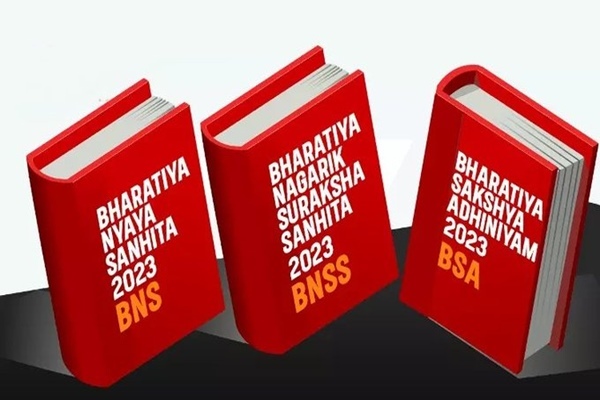New Delhi, July 1: Three new criminal laws were enacted in India on Monday. Following their implementation, the first FIR was registered at Kamla Market police station in Delhi. This complaint, filed by a police officer, led to charges against a street vendor under Sections 173 of the BNSS and 258 of the BNS.
These new criminal laws, Bharatiya Nyaya Sanhita (BNS) 2023 replacing the Indian Penal Code (IPC) 1860, Bharatiya Nagarik Suraksha Sanhita (BNSS) 2023 replacing the Code of Criminal Procedure (CrPC) 1973, and Bharatiya Sakshya Adhiniyam (BSA) 2023 replacing the Indian Evidence Act 1872, have met with significant controversy. The passage of these laws in Parliament, which involved the exclusion of Opposition MPs, has been a focal point of heated discussions nationwide.
Legal experts and human rights activists have criticized the government for what they perceive as a hasty and poorly prepared decision. They argue that the laws will exacerbate police abuse and oppression rather than address critical issues like media regulation and the recovery of funds from economic offenders. Critics suggest that the government should have focused on creating laws to curb societal hatred and reclaim money looted from the country.
 Former Delhi Minority Commission member and Delhi High Court Advocate Raees Ahmed highlighted the introduction of features like zero FIR and online police complaints in the new laws. Summons can now also be served via SMS. However, Ahmed pointed out that a significant portion of the population lacks access to these technological conveniences, potentially making justice more difficult for marginalized communities.
Former Delhi Minority Commission member and Delhi High Court Advocate Raees Ahmed highlighted the introduction of features like zero FIR and online police complaints in the new laws. Summons can now also be served via SMS. However, Ahmed pointed out that a significant portion of the population lacks access to these technological conveniences, potentially making justice more difficult for marginalized communities.
Ahmed further noted that while the laws include provisions for punishment in lynching cases, they also grant the police extensive powers to act against civilians under terrorism charges. Notably, the Supreme Court’s previous order against handcuffing accused individuals has been overridden by Section 43(3) of the BNSS, which allows police to handcuff suspects.
Changes have also been made concerning police custody and detention. Depending on the nature of the case, police can now reacquire custody of an accused within 30 or 60 days, enabling necessary confrontations between the accused individuals. This adjustment is seen as significant for effective investigation processes.
The Indian Justice Code also stipulates harsher penalties for crimes involving women and children, and new laws have been established for specific offenses.
Ahmed expressed that the new laws appear to be rebranded versions of the old ones, a sentiment echoed by the Opposition, which has labeled the process as “cut-copy-paste.” He revealed that a lack of resources has impeded proper training on these laws, especially in Hindi-speaking regions, raising concerns about implementation difficulties in other states with different linguistic backgrounds. This concern is shared by the Chief Ministers of Tamil Nadu and West Bengal, along with various Opposition leaders and Bar Associations, who have opposed the new laws.
Ahmed concluded by suggesting that the Government should have developed standard operating procedures and provided training in local languages across all states before implementing these laws, which might have reduced the level of opposition faced.




